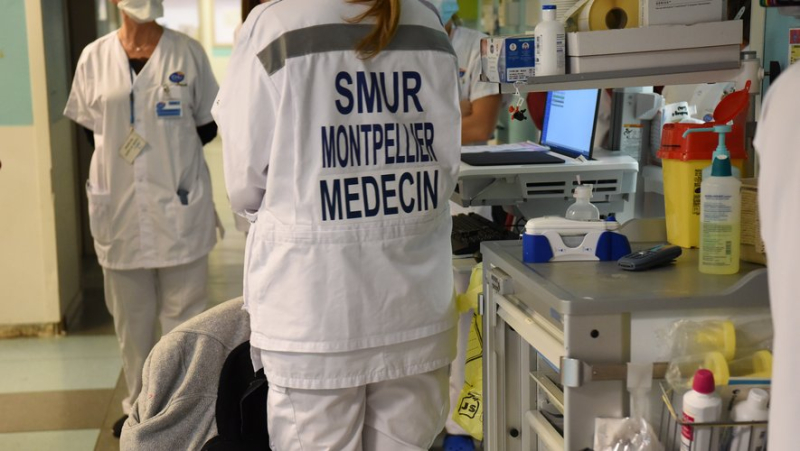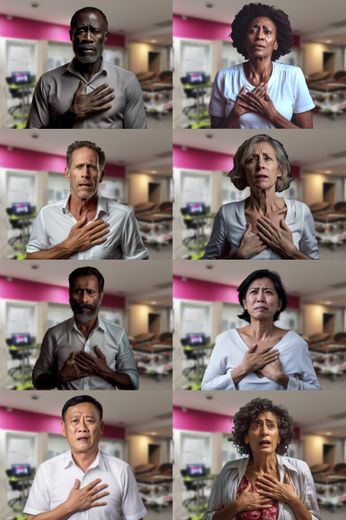Sex, ethnicity: the shocking investigation by Montpellier doctors into discrimination against patients in emergency rooms

En fonction des préjugés, les patients ne bénéficient pas de la même prise en charge. Midi Libre – RICHARD DE HULLESSEN
"Our assessment of the severity of patients in the emergency room is subject to discrimination" : Xavier Bobbia, emergency physician at Montpellier University Hospital, coordinated a study which shows that for equal symptoms, black patients are taken less seriously than white patients, and women less than men. The survey is published in the international journal European Journal of Emergency Medicine.
"We do not claim to change prejudices, but when we see the result, we can only be horrified" : emergency doctor at the Montpellier University Hospital and lecturer at the Montpellier-Nîmes medical faculty, Xavier Bobbia had the feeling that not all patients arriving in the emergency room received the same care.

Xavier Bobbia: "We do not claim to change prejudices, but to raise awareness, yes". DR
He wanted to check it. And the result of the survey, carried out this summer among 1,563 colleagues in France, Switzerland, Belgium and Monaco, raises questions: it shows that with identical symptoms, men are taken more seriously than women, white people more than people of color. At both extremes, a black woman will have 50% less chance of being well cared for compared to a white man, concludes the thesis carried out by Guillaume Olivier, a student of Xavier Bobbia. It gave rise to an article published at the end of December in the European journal of emergency medicine.
"Very interesting", "edifying", "disturbing"… the results provoke a reaction from the medical community.
What are our prejudices ? At the start of the investigation
"We judge that the majority of diagnoses made by doctors are done intuitively", recalls Xavier Bobbia. In other words: "When you put a doctor face to face with the same situation, what he perceives will be integrated into an intuitive reasoning of the situation which leads to a diagnosis", and it is up to him to make a diagnosis. #39;all the more relevant as the doctor is experienced, underlines the Montpellier resident, who wanted to go further: "If these intuitive diagnoses are linked to our experiences, they are also linked to our prerequisites, my conviction is that we live in a society with racist and sexist prejudices.
How far do they influence the way of treatment ? This is the subject of the investigation. < /p>
A survey based on eight profiles generated by Midjourney artificial intelligence
To avoid bias, the study is based "on a clinical situation whose symptoms and severity are identical in men and women". The choice fell on chest pain "neither serious nor reassuring", and it's the same text which was provided to the participants to find out how they would direct the patient in the triage done upon entry to the emergency room, defined on a scale of 1 to 5, from the most urgent to the least urgent.
For each participant, an image accompanies the clinical picture. These are computer-generated images of patients in distress produced by Midjourney artificial intelligence, all with the same attitude, but according to eight typical profiles: four men, four women, but with an ethnic appearance which differs, to simplify, black, white, North African, Asian.

The profiles submitted to emergency doctors were generated by Midjourney artificial intelligence. DOCUMENT DR THESIS BY GUILLAUME OLIVIER
Each participant received the text and had access to an image, with instructions: "Visual assessment of severity in emergencies", "to be sure that&# “They would look at the image,” says Professor Bobbia. "The responders did not know the objectives of the study", specifies Guillaume Olivier's thesis.
The study is randomized, conducted blindly, the distribution of images was random. Each image was presented at the same frequency. From July 14 to August 15, 2023, 1,563 French, Swiss, Belgian and Monegasque emergency doctors and nurses looked into the case submitted to them.
The results
"The result is even more marked than I had imagined", admits Professor Bobbia. With the same clinical picture, if the case is judged on average 55% as a vital emergency, it is 62% when the patient is a man, compared to 49% when it is a man. ;#39;a woman.
If we are only interested in ethnicity: "The North African ethnicity was most often classified as a vital emergency, at 61%, ahead of the ' “white ethnicity, 58%, Asian, 55%, and black, 47%”, specifies the study.
The largest gap in interpretation separates the white man, considered 63% in a life-threatening emergency, from the black woman, who has a score of 42%: "You have a 50% greater chance of being well taken care of when you are a white man than when you are a black woman", deciphers Xavier Bobbia, knowing that "when we assess that a case is less serious, we diagnose later".
"This is the first time that such a study has been carried out in France", indicates the doctor, who specifies that it was carried out "with the help of the French Society of Emergency Medicine" and with the agreement of the ethics committee of the Montpellier University Hospital.
What follows ?
"Once we have made this observation, what do we do ?"? asks Xavier Bobbia. "We must first inform, and realize our prejudices. By raising awareness, we can change things,” says the doctor, who submitted the test to 27 of his students at the Montpellier-Nîmes medical faculty, “with the same results.” .
His second conclusion is "that much importance must be given to triage, the heart of our emergency specialty". Following this study, the Montpellier University Hospital "has just changed its triage scale, so that it is more relevant and more precise".
The establishment wants to go even further: "We are currently doing a multicenter study to see how we can integrate artificial intelligence into our evaluations, I' ;#39;believe in it a lot.
I subscribe to read more




